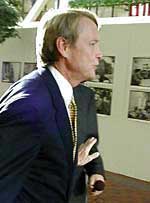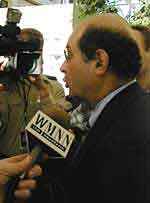By Michael Khoo
Minnesota Public Radio
December 27, 2001
|
| RealAudio |
The Minnesota Twins appeared before the state Court of Appeals Thursday, seeking to overturn a temporary injunction requiring the team to play the 2002 season at the Metrodome. Last month, a state district court granted the injunction to the Metropolitan Sports Facilities Commission - which owns and operates the dome. The commission asked for the injunction in response to reports the Twins faced elimination from Major League Baseball. The Twins argue the court's action is an unwarranted intrusion into a private business decision. The commission and the attorney general's office say compelling the team to play does no more than enforce the Twins' lease at the Metrodome.
| |
|
|
|
||
The Minnesota Twins argue that upholding the lower court decision could upset Major League Baseball's timeline for eliminating two teams in advance of the 2002 season. Lawyers for the team say the court order, which requires the team to play a full season at the Metrodome, is intrusive and without precedent. But early in oral arguments, Appeals Court Chief Judge Edward Toussaint questioned whether the present case isn't unique.
"Is there no difference between the Minnesota Twins and any other commercial entity as you described?" asked Toussaint.
Twins attorney Roger Magnuson acknowledges the team is in some ways distinct from other businesses - but, he says, not in any substantive sense that would justify the lower court's injunction. Magnuson implied that decision was based on emotional considerations, and what he calls "Homer Hanky jurisprudence."
"The fans are cheering and the Homer Hankies are waving, but there has to be some institution that applies the law," Magnuson argued. "It's like the umpires on the field. They've got to tune out the politics, the pragmatists and have got to call balls and strikes according to fixed rules. And we look to you - the men in blue - to establish the rule of law."
Magnuson argues the Sports Facilities Commission is only entitled to monetary damages if the Twins forfeit on their Metrodome lease. But the commission feels otherwise.
Drawing on the legislative and judicial record, attorneys for the commission argue the team should be considered an important community asset that provides substantial, non-monetary benefits - civic pride, economic stimulus, social cohesion. Therefore, they argue, the team can't escape the lease with a simple payment of damages.
| |
|
|
|
||
The team, while acknowledging the public benefits in such intangible ways, says the commission itself is limited to the specifications of the contract. Judge Toussaint raised that point with the attorneys for the commission and the attorney general's office.
"But it appears that the irreparable damage argument goes to the public. But the question ultimately is the contract between the commission and the Twins. And the issue is whether THOSE damages are ascertainable," Toussaint said.
State Solicitor General Alan Gilbert, arguing in support of the Sports Facilities Commission, says the lease makes it clear policy-makers expected more from the Twins than money. Under the use agreement, the team pays no rent and is given a substantial amount of ticket and concession tax revenues.
Gilbert says it defies logic to argue - as the team's attorneys do - that the use agreement is a standard landlord-tenant lease. He says the Legislature didn't approve construction of the Metrodome in order to draw a profit.
"Mr. Magnuson doesn't say this, but his suggestion is they did it because they wanted to be a commercial landlord. They wanted to make rent money off of the Metrodome," said Gilbert. "I say to you, I submit to you, that that's preposterous. That's not what the Legislature had in mind. The Legislature is not in the business of a commercial landlord."
The Court of Appeals now has 90 days to rule on the team's appeal. But the court has been directed by the state Supreme Court to expedite the matter. The losing side will almost certainly appeal to the state Supreme Court. That could push final resolution of the case into February - the start of spring training - or beyond.
More from MPR

